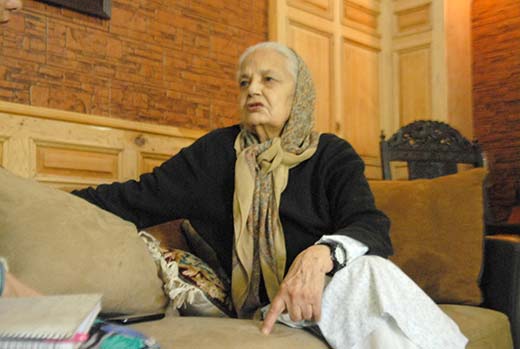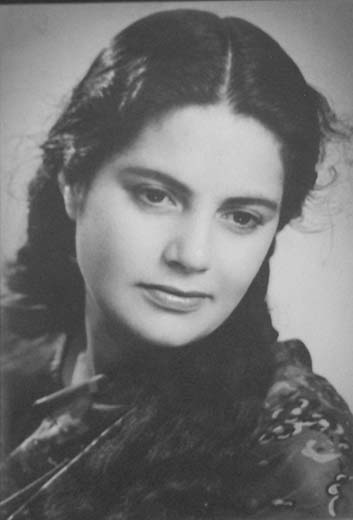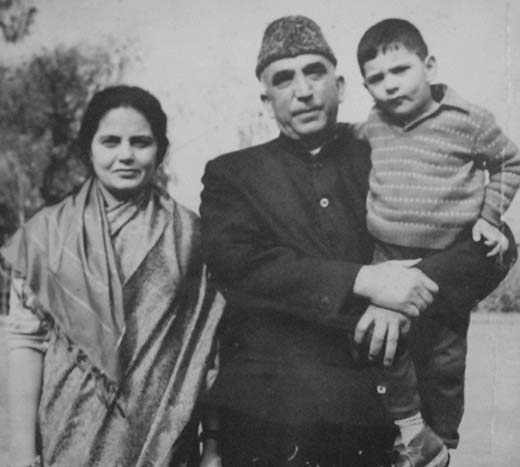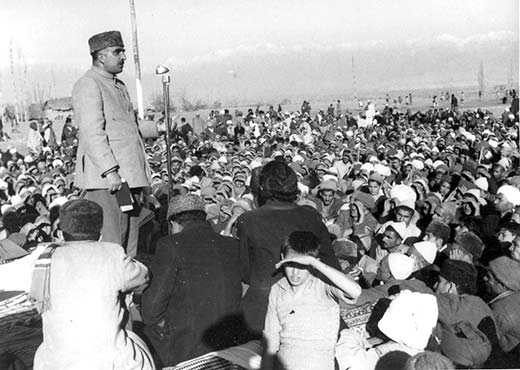After replacing Sheikh Abdullah in 1953, Bakhshi Ghulam Mohammad led a popularly corrupt regime. Syed Asma meets the former Prime Minister’s surviving wife to tell the story of how she fought, after his death, every day to raise her two sons, now serving the state government.

Pic: Bilal Bahadur
Like Sadiqs’, Bakshis’ too ceased to exist in the political camp of Jammu and Kashmir after the duo, G M Sadiq and Bakshi Ghulam Mohammed died. Perhaps no other family could sustain the political lineage as Sheikhs do!
Bakshi Ghulam Mohammed died at the age of 65 on July 15, 1972 after having a political career of 41 years and serving the state as a Prime Minister (PM) for a decade – longest period any Prime Minister could serve in Jammu and Kashmir.
Dubbed as an ‘able’ administrator of a corrupt regime, Bakshi Ghulam Mohammed, did not leave much of a property for his then surviving wife – second wife, and her two sons – Javaid and Jehangir. He perhaps did not had much property in his name. For Khursheed Jalal-ud-din – Bakshi’s second wife, and his two sons, he left a mansion for them to live in. The mansion was bought after taking a bank loan of Rs 8.50 lakhs which after his death was paid by Khursheed from her salary.
The sons later dismantled the mansions and erected two bungalows adjacent to each other at the same site.
Khursheed, was a well-educated woman and a well-known educationist of her times. She had started her career as a teacher and later headed Government Women’s College and the Directorate of Education as well before retiring in 1988.
Wearing a simple white dress with a black sweater and neatly tied hair half-covered with a multi-coloured scarf, Khursheed still looks elegant. She still is beautiful as she was known in her times. The ninety-two-year-old, once the first lady of the state, Khursheed does not remember many details about her past now. Suffering from dementia, she just remembers snippets, and her children say she does not talk much anymore.
Khursheed spends her day writing her diary and reading books. These days she is reading Omar Khayyam. Mastering languages like English, Urdu, Persian and Arabic, Khursheed still reads without glasses.
Though she does not remember the specific details and dates but a mention of Bakshi Ghulam Mohammed still brings a shy smile on her face and she proudly says, “Bakshi fell for me as I was very beautiful and out-spoken. Then he decided to marry me and now we have two sons.”
She adds, “I was a member of Bakshi’s peace brigade where we shouted- ‘Hoshyar Khabardaar Hum Kashmiri hai tayaar…Hoshyar Khabardaar Hum Kashmiri hai tayaar….”
She keeps on repeating the story with same pride each time when asked anything about Bakshi. Pointing her finger towards a photograph of Bakshi Ghulam Mohammed on the wall adjacent to her, she says “we have a much bigger portrait of him right outside my room,” after a brief pause, she starts again, “He and Sheikh were great leaders of our times and they were close friends.” Her snippets lack coherence; they are not in proper flow but a part of the history!
“Sheikh was poor but was our leader. It was our [her father’s] red car which he used on the day of his marriage to get Begum Akbar Jahan home,” she shares hesitantly.
Dementia has taken toll on her memory and she does not remember the whole story how she and Bakshi met but her acquaintances and some historians do remember how and when they got married.

Khursheed, popular as Sisi, was Principal of Government Women’s College, Srinagar and Bakshi Ghulam Mohammed was the Prime Minister of the state; it was the time when Bakshi was working on Jashn-e-Kashmir and was attending cultural functions. Zareef Ahmed Zareef, a poet and satirist who is well versed with the local history says, “Bakshi had developed an interest in this out-spoken and extremely beautiful woman whom he married later.”
Ghulam Nabi Khayaal, a writer and journalist, too shares a similar story and says, “Bakshi had sent a proposal of marrying Khursheed to her mother, Begum Barkat, who had no other answer but a yes.” Khursheed was 15 years younger to Bakshi.
Bakshi had earlier married an illiterate girl from Bhat family of Karfali Mohalla, Habba Kadal, Srinagar and had two children – a daughter and a son, Bakshi Bashir and Bakshi Shama. The first wife died three years after Bakshi married Khursheed.
Zareef says, when Baskhi married Khursheed (Sisi), his first wife was not well, and he needed a “good presentable” first lady for the state who could interact with people including the international delegates visiting Jammu and Kashmir. Sisi was the best choice then. While marrying Khursheed being a Prime Minister played an edge for him otherwise it was a mismatch. Khursheed was well-educated and the UK returned student heading one of biggest educational institutes of the state and Bakshi was a school-drop-out.
Bakshi, born in Nawa Kadal, Srinagar, belonged to a very poor family. Having seven sons, their labourer father – Abdul Ghaffar Bakshi and Janni Begum could not afford them a good education so he had to leave school in Class 8th. Before joining politics in 1931 his parents got him married when he was a worker in Khadi Bhandar. His monthly salary was just 6 ½ Annas.
He and Sheikh Mohammed Abdullah had entered into politics almost together. Sheikh and Bakshi were together in National Conference till the time Bakshi took over as the Prime Minister of the state and Sheikh was jailed in 1953.
The year came in with a change – for Kashmir in general and Bakshi in particular.
The ten years of Bakshi era helped many to raise and stabilize their economic status including his family. His brothers exploited his name and position to come out of their humble and modest background.
The corruption and hooliganism of Bakshi brothers was so much so that it earned them a name of BBC- Bakshi Brother Corporation, Ghulam Nabi Khayaal remembers. “Their corruption earned them this name.” This infamous corruption had to make Bakshi sit in an accountability commission named as Ayyenger commission.
Khayaal says, “The outcome of Ayyenger Commission was not clear. What we heard then was that Bakshi was held guilty but after he stepped down, the commission as well as the results vanished somewhere.”
Six brothers of Bakshi Ghulam Mohammed made full use of those ten years of his Prime Ministership to earn them the status they are now holding.

“Today Bakshis are among the biggies of Kashmir. They used Bakshi Ghulam Mohammed’s prime ministership to grow their economies. The PM knew about their wrongdoings but he never reacted against them which worked in their favour,” says Ghulam Nabi Khayaal.
Khursheed believes Bakshi Ghulam Mohammed had to bear the brunt of what his relatives did.
Khayaal says most of the buildings in and around Sonawar were forcefully grabbed by hooliganism of Bakshi brothers. Some buildings of immense commercial importance in Lal Chowk were also wrested, alleges Khayal who was an active reporter in that era.
Apart from taking financial benefits from the Bakshi Ghulam Muhammed during his regime, the family had taken other benefits as well. “It was Bakshi who inducted Shama’s husband Nasrullah Mir, a lecturer, into Indian civil services after which he was appointed as the District Commissioner of the state,” remembers Zareef.
But all these favours were in vain. Once Bakshi married Khursheed, his relationship with his brothers and children from first wife got bitter.
“They distanced themselves from daddy [Bakhsi Ghulam Mohammed] after he married Mummy [Khursheed],” says Bakshi Javaid, Khursheed’s older son. Academically an engineer, Javaid is presently Chief Executive Offcier (CEO) Yusmarg Development Authority.
Jehangir, the younger brother, is the top Radiologist of India and posted in a hospital in Srinagar.
The Bakshis evicted Bakshi Ghulam Mohammed from the entire property and he was left with just a house which was taken on a bank loan. This all happened during the last years of his Prime Ministership wherein he was made to step down.
“I do not remember exactly but I have heard that initially it was daddy’s colleagues who lend him the kitchenware to start a new house after his second marriage,” says Javaid.
Khursheed’s two sons, Javaid and Jehangir were too young when Bakshi Ghulam Muhammed passed away. Javaid was 8 year-old and Jehangir was 6 year-old.
Bakshi Ghulam Mohammed was distanced away by his family during his lifetime, so owning Khursheed and her two sons after Bakshi’s death was out of question.

So, it was Khursheed who had to pay all the debts of Bakshi Ghulam Mohammed after he passed away including his death duty of perhaps Rs 20,000, says Javaid.
Khursheed managed it all alone – Bakshi’s debt’s, children’s education and the family’s survival. Khursheed is reluctant to talk about Bakshis but hesitantly says, “After Bakshi sahib’s death they all became my enemies.”
After Bakshi’s death, she along with Javaid and Jehangir went to live with her mother in Buchwara, Dalgate and kept the mansion on rent and did not claim a penny from their property, in fact had surrendered a few things to them after Bakshi died.
An educationist of her times, a well-read woman, had concentrated much on her children’s education. “I wanted education to be on their side not money,” says Khursheed with a straight face pointing towards Javaid. “Money follows later!”
Javaid says his mother Khursheed was always more particular about their studies because she did not want to take favours from anyone at any point of time. He remembers, when he was in Class 10th, Khursheed told him, “Do not expect your father’s name or my position being an educationist, would help you fetch good marks or admission into any good institution. You have to earn everything yourself.”
Both Javaid and Jehangir still remember the lesson, they say. Proving her point, Khursheed never helped them or asked for favours from anyone. Both Javaid and Jehangir had to sit home unemployed for four years before joining state services.
“Let alone favours I think both Jehangir and I have suffered being Bakshi sahib’s sons. We were not even awarded our promotions due in time. But it is ok, we survived well,” says Javaid.
Both the sons say whatever they are right now, they owe it to their mother. We have never said ‘No’ to any of her commands.
Starting their education from Woodland school in Srinagar, Javaid joined Burn Hall School in Class 5th and Jehangir in Class 4th. They did their higher secondary school exams from S P School. Later, after qualifying state competitive examination Javaid went to the Regional Engineering College and Jehangir went to the Government Medical College.
Getting them educated was a tough job for Khursheed, Javaid remembers and Khursheed nods her head in agreement. “We were the most mischievous children in the whole locality so no tutor could handle us. Then mummy [Khursheed], being the Director Education looked for the toughest teacher around. She found Burnhall’s Avtar Krishan Bakshi.”
“He used to make us hold our ears through our legs for hours together, which was difficult! We chose an easy thing – we studied well,” laughs Javaid.

He remembers his mother being strict about their education since the beginning, even when their father Bakshi was alive. “Daddy at times wanted to take me along to his public gatherings but mummy never allowed. She never allowed us to miss our school,”
Khursheed has been a strict mother throughout and it was her decision that her sons will not join politics. “We got many offers to form new political parties or to join the older ones but our mother never allowed. She said she will disown both of us which was unacceptable,” says Javaid.
“And knowing the woman of conviction she is, she would actually do it, so we preferred maintaining distance from politics.”
This is the reason Bakshi’s political legacy was not taken forward. Bashir, Shama and his brothers and their children did not join because of the bitter relation they shared with Bakshi Ghulam Mohammed in the end. Though, with time the relations got sorted out as Javaid, Jehangir and Bakshi’s grandchildren used to share same school later.
But the family says that it was Bakshi’s wish that no one from his family should join politics.
Khursheed now spends most of her time reliving whatever memories are left post dementia. But one look at Bakshi’s picture and Khursheed’s face glows with joy. She is again the first lady she once was and living through glorious Kashmir!
















After reading the interview based report and related pieces, can’t resist saying hats off to Kashmir Life team for putting together in print what was known to many but not available in shape of a document. However, there is no mention of the clergy, institutions run in the name of religion, mujawirs and what we call in Urdu ‘shikam parast’ mullas giving legitimacy to the farce of a popular yet corrupt regime. Nor has been the role played by (then) existing and sponsored print media, so-called intellectuals and writers discussed.
I agree with Ms Asma for the conclusions she wants us to draw. Bakhshi era was the darkest era. But could not one question be asked. Why is the family of one of Kashmir’s longest serving Prime Ministers not given the benefit and the privileges that others like Abdullah. Muftis, the families of Mir Qasim, Sadiq have got . I do not want to get into the debate about who was good and who was bad but a law is there that protects the families of former heads of J&K. The law that was piloted by NC mentions the Chief Ministers and the former Chief Ministers. Was the word former Prime Ministers deliberately omitted by votaries of autonomy? Was it done to have a family up-manship at the cost of the tax payer? There is no doubt that the autonomy of the state of J&K started diluting in Bakhshi era. Having despite being an illetrate, he survived as Prime Minister of the state and installed his puppet Shamsuddin also as Prime Minister. I hope Kashmir Life’s able reporter like Syed Asma find time to see the issue from this prism as well.
VERY GOOD STORY…BAKSHI SAHAB WAS THE BEST LEADER WE HAVE TILL DATE…PEACE BE UPON THE DEPARTED SOUL..
Thanks for nice piece of information about the Bakhshi family